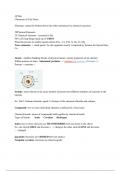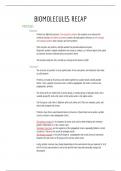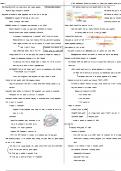Ap biology macromolecules Study guides, Class notes & Summaries
Looking for the best study guides, study notes and summaries about Ap biology macromolecules? On this page you'll find 53 study documents about Ap biology macromolecules.
Page 4 out of 53 results
Sort by
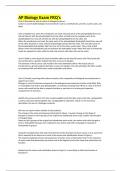
-
AP Biology Exam FRQ's (Unit 1)
- Exam (elaborations) • 3 pages • 2024
-
- $9.69
- + learn more
AP Biology Exam FRQ's (Unit 1) Describe the role of carbon in biological systems. Carbon is used to build biological macromolecules such as carbohydrates, proteins, nucleic acids, and lipids. (Unit 1) Explain how, when the membranes are fused, the polar parts of the phospholipids from one cell will interact with the phospholipids from the other cell and how the nonpolar parts of the phospholipids from one cell will interact with the phospholipids from the other cell. When the membranes ...
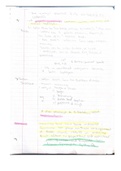
-
Unit 1 AP Biology Notes
- Interview • 13 pages • 2023
- Available in package deal
-
- $4.49
- + learn more
Full notes covering every topic in Unit 1 in AP Biology, or Chapter 3 in the AP Biology textbook. All content covered on macromolecules including carbohydrates, proteins, lipids, and nucleic acids.
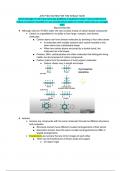
-
AP Biology notes EVERY UNIT! (taught by a Dr. in Biochemistry)
- Class notes • 57 pages • 2024
-
- $14.89
- + learn more
A 57 page Google doc turned into a pdf that covers everything YOU need to know for AP Biology. My teacher is Dr. John Fuller who has a PhD in biochemistry from UCLA. Dr. Fuller has also done research in labs and contributed to academic papers, one of the most groundbreaking academic papers being about homeobox genes, which just happens to be in the cirriculum for AP Bio. There are also Google slides that Dr. Fuller has made over his 20+ years of teaching AP Biology for unit 8 and other units (...
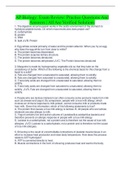
-
AP Biology: Exam Review: Practice Questions And Answers | All Are Verified Solutions
- Exam (elaborations) • 46 pages • 2023
-
- $13.99
- + learn more
AP Biology: Exam Review: Practice Questions And Answers | All Are Verified Solutions 1. The digestive enzyme pepsin works in the acidic environment of the stomach to hydrolyze peptide bonds. On which macromolecules does pepsin act? A. carbohydrate B. protein C. DNA D. lipid B. Protein 2. Egg whites consist primarily of water and the protein albumin. When you fry an egg, why does the egg white turn from clear to white? A. The protein becomes dissociated. B. The protein acquires tertiar...
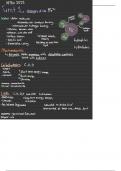
-
AP Biology Unit 1 (Chemistry of Life) Notes
- Interview • 2 pages • 2023
-
- $7.99
- + learn more
In depth AP Biology Unit 1 (Chemistry of Life) notes containing all the information you need for your quizzes, tests, and the final AP exam. The topics covered in these notes are the properties of water and macromolecules (the two main subjects of Unit 1). Knowing the information on these notes will cover everything you need to know for Unit 1, especially for the AP exam. I promise you, studying these and the other units I will post soon will get you at least a 3, with the majority of you scorin...
Chemistry of Life Notes for AP Biology
Summary of the most important and simple information regarding biomolecules. This document includes the function and structure of proteins, lipids, and carbohydrates. Great for studying prior to an exam.
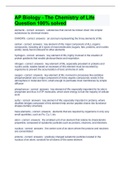
-
AP Biology - The Chemistry of Life Question 100% solved
- Exam (elaborations) • 9 pages • 2023
- Available in package deal
-
- $13.49
- + learn more
AP Biology - The Chemistry of Life Question 100% solvedelements substances that cannot be broken down into simpler substances by chemical means CHNOPS an acronym representing the 6 key elements of life carbon key element of life; major component of ALL organic compounds, including all 4 types of macromolecules (sugars, fats, proteins, and nucleic acids); rarely found unbound to other elements hydrogen key element of life, highly involved in the creation of protein grad...
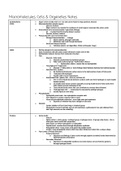
-
Macromolecules, Cells, and Organelles Notes (includes Surface Area to Volume Ratio)
- Interview • 3 pages • 2022
-
- $10.49
- + learn more
This is a in depth study guide and review of macromolecules, cells, organelles, and surface area to volume ratio. It is content from AP Biology but can be used for regular biology, AP biology, and college biology as well. It is broken down into two column notes and well organized to help condense loads of material into a simple, easy-to-understand, but thorough study guide. It discusses the four major macromolecules as well as the subdivisions and details of each one. It looks at the difference ...
Notes on transcription and translation. Includes all the enzymes and proteins that go into each process and includes pictures that help visualize the process better.

How much did you already spend on Stuvia? Imagine there are plenty more of you out there paying for study notes, but this time YOU are the seller. Ka-ching! Discover all about earning on Stuvia



